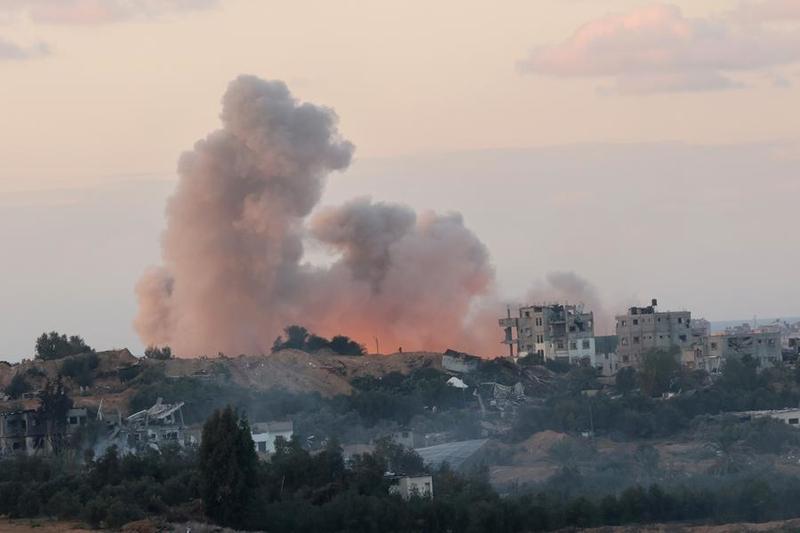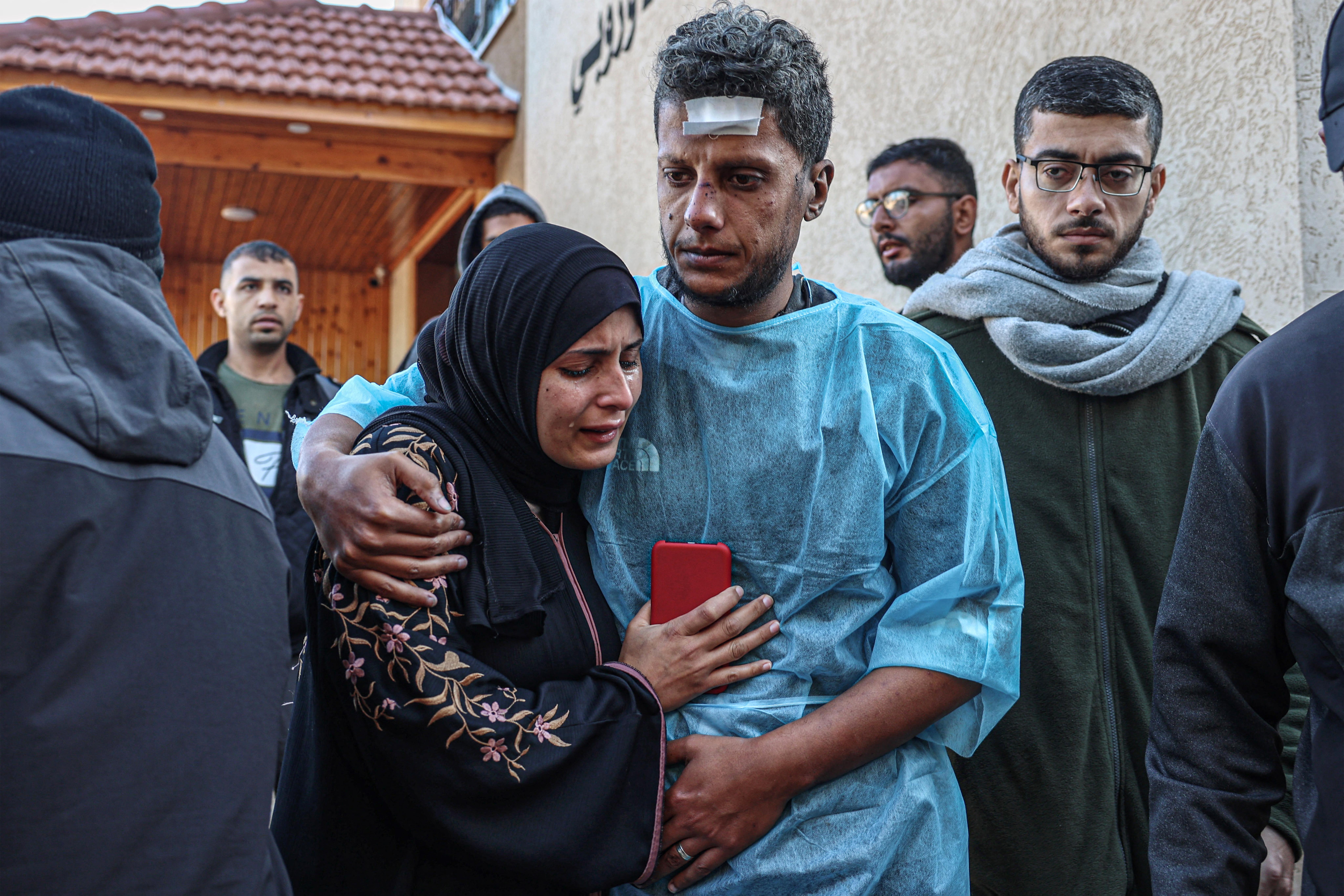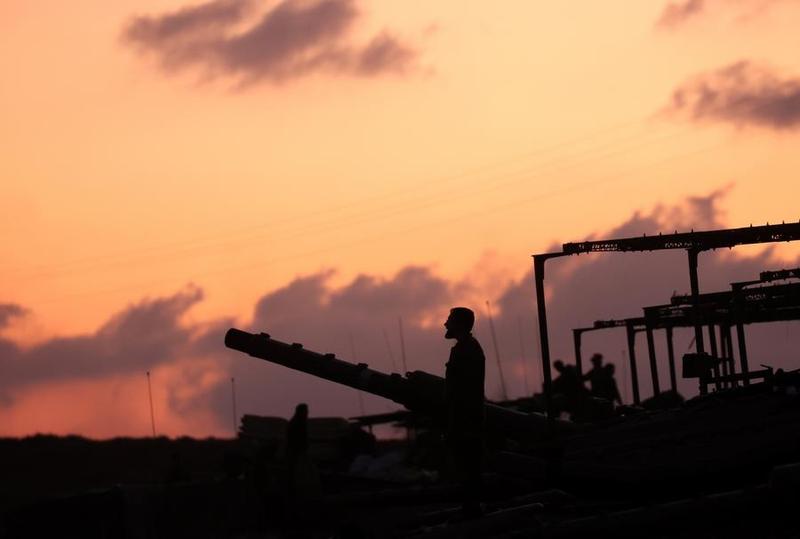 Smoke rises from damaged buildings in the northern Gaza Strip as seen from southern Israel, Jan 4, 2024. (PHOTO / XINHUA)
Smoke rises from damaged buildings in the northern Gaza Strip as seen from southern Israel, Jan 4, 2024. (PHOTO / XINHUA)
GAZA / JERUSALEM / ATHENS / TEHRAN - The Palestinian death toll from the ongoing Israeli attacks on the Gaza Strip rose to 22,722, the Gaza-based Health Ministry said on Saturday.
The ministry said in a press statement that the Israeli army killed 122 Palestinians and wounded 256 others during the past 24 hours.
This brings the total number of deaths to 22,722 and injuries to 58,166 since Oct 7, 2023.
Iranian Foreign Minister Hossein Amir-Abdollahian said on Saturday that the security of Gaza and the West Bank is interconnected with that of the region and "war is not the solution"
Israeli army spokesperson Avichay Adraee on Saturday said their forces raided an area in Gaza City from which fire was fired during the past few days.
Adraee said the forces found inside a clinic bags belonging to the UN Agency for Palestine Refugees which were used by the Hamas movement to hide military jackets, while rocket-propelled grenade launchers, Kalashnikov rifles, and ammunition were found in a nearby building.
ALSO READ: Hamas leader urges Blinken to end Gaza crisis on Mideast tour
Also on Saturday, the Israeli army announced that it has dismantled the military framework of Hamas in the northern Gaza Strip.
Israel Defense Forces (IDF) Spokesman Daniel Hagari said in a press conference that in the north of the strip, Hamas had two military brigades with 12 battalions, "which had about 14,000 terrorists."
He added that "Hamas does not function in this region in an organized manner, and we have revoked the main terrorist capabilities in the area."
Hagari detailed the methods in which the Israeli army operated, including the elimination of commanders, ground combat, intelligence gathering, locating rockets and other means of warfare, and destroying the underground infrastructure.
He noted that the IDF located about 70 million intelligence files, including information on senior Hamas members in Gaza and beyond, along with computers, maps and radios.
 Relatives of Palestinians killed during Israeli bombardment, mourn their loved ones at the European hospital in Khan Yunis in the southern Gaza Strip, on January 6, 2024, amid continuing battles between Israel and the Palestinian militant group Hamas. (PHOTO / AFP)
Relatives of Palestinians killed during Israeli bombardment, mourn their loved ones at the European hospital in Khan Yunis in the southern Gaza Strip, on January 6, 2024, amid continuing battles between Israel and the Palestinian militant group Hamas. (PHOTO / AFP)
The IDF spokesman affirmed that the fighting would take time and continue during 2024, adding that the army is now focusing on dismantling Hamas' operations in the center and south of the enclave.
"We will do it with a different method, in a comprehensive way and based on the lessons we have learned from the fighting so far," he noted.
Meanwhile, Greek Prime Minister Kyriakos Mitsotakis met with US Secretary of State Antony Blinken in Hania, Crete on Saturday, and expressed growing concern over the humanitarian situation in Gaza.
During the meeting, Mitsotakis also expressed concern about the risks of escalating tensions in the Middle East and the repercussions for regional stability and security, reported Greek national news agency AMNA.
ALSO READ: Israel claims military operations suspension in parts of Rafah
"These are difficult and challenging times for the region," Mitsotakis said, reiterating the need for an unhindered flow of humanitarian aid to Gaza
He also underlined that the solution can only be political, based on the two-state solution in accordance with UN resolutions.
After the meeting, Blinken, who was on his Mideast diplomatic mission, told reporters that he wants to make sure the conflict in the Middle East "doesn't spread."
Mitsotakis and Blinken also exchanged views on bilateral ties and other international issues.
In Tehran, Iranian Foreign Minister Hossein Amir-Abdollahian said on Saturday that the security of Gaza and the West Bank is interconnected with that of the region and "war is not the solution."
 Israeli troops are seen near the border with the Gaza Strip, in southern Israel, on Jan 4, 2024. (PHOTO / XINHUA)
Israeli troops are seen near the border with the Gaza Strip, in southern Israel, on Jan 4, 2024. (PHOTO / XINHUA)
He made the remarks in a phone call with his French counterpart Catherine Colonna, according to a statement released by the Iranian Foreign Ministry.
During the talk, Amir-Abdollahian said the only way to prevent the expansion of the Israel-Hamas conflict and ensure lasting peace in the region is to pay "responsible" attention to "the roots of the challenges" and be determined to resolve them.
Blaming the regional instability on Israel's occupation of Palestinian territories under the US appeasement, Amir-Abdollahian said it was impossible to turn a blind eye to these root reasons while at the same time voicing concern about security in the region.
Colonna, for her part, expressed concern over the escalation of the tensions in the region, calling on Iran to help prevent the widening of the conflicts' scopes.
READ MORE: Palestinian PM: Gaza witnesses unprecedented starvation
The two sides also agreed on the importance of continuing their diplomatic consultations and contacts, highlighting the necessity to remove obstacles to the expansion of bilateral relations in an atmosphere based on mutual respect.


